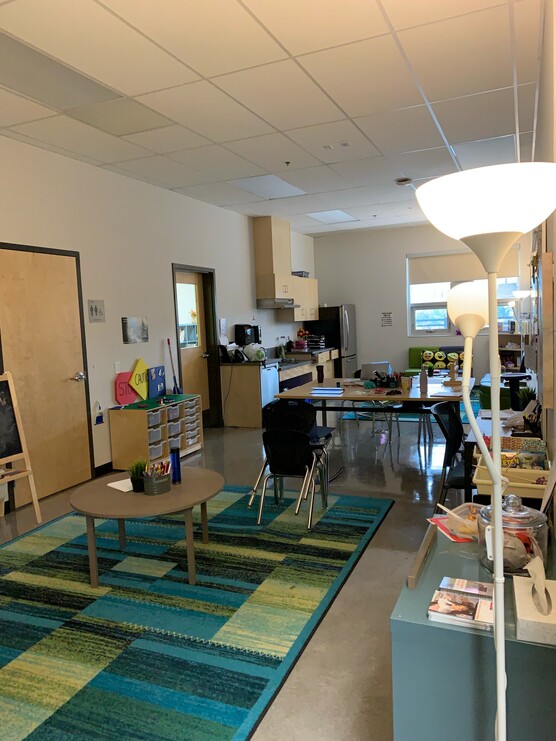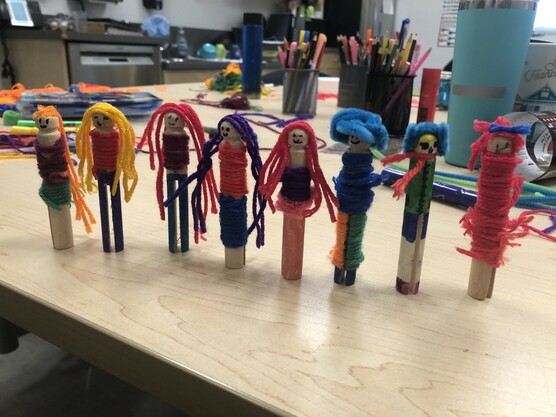What is a Child Development Advisor?
The CDAs are part of the learning support and administration team. We believe it is important children feel comfortable, safe and have the social and emotional skills to thrive in today’s society.
We support children through one-on-one meetings, small groups, in-class presentations, school-based wellness activities, breakfast club and use of the wellness room. We aim to be a resource for parents, students and school staff.

Wellness Room
The Wellness Room is a room in RancheView dedicated to supporting the social emotional wellbeing of students. It is designed to appeal to the senses and provide a calming environment where students can unwind, talk, connect, have privacy to discuss hard things, problem solve, have fun and participate in small groups.
We offer a variety of programs throughout the day and have a schedule posted on our door.

There are a variety of small groups offered to students to help build up their social and emotional skills. Groups are designed based on student needs.
Worry Warriors
For the little wranglers, Worry Warriors teaches about your worry monster and how to tame it. We learn skills such as belly breathing, why we worry and what we feel, as well as other topics.
Stress Busters:
- Week #1- what is stress, what are my stressors
- Week #2- Levels of stress, Where I feel stress in my body, Fight/Flight/Freeze
- Week #3- How thoughts cause feelings- choice over thoughts (positive/negative)
- Week #4- Common thinking traps, How to replace worry thoughts with positive thoughts
- Week #5- Thought inspection- how to challenge negative thinking
- Week #6- Coping Strategies- Deep Breathing, Be Mindful, Squeeze a ball or fidget, Visualization
- Week #7- Coping Strategies cont. - Exercise/physical activity, Journal. Keys to Conflict/ "I "message
- Week #8- Wrap up- take home glitter jar and key ring with coping strategies
Friendship/Social Skills
Qualities of a good friend, what makes me unique, how to make a friend, cooperation, conflict resolution, common friendship problems and so on.
Positive Self
Focus on being your best self. Topics covered are around self-esteem, physical and mental health, communication, problem solving and confidence.
Fantastic Friends
For the little wranglers, Fantastic Friends is centred around the importance of play on social-emotional development. We come together, play some games and make some new friends! We have brief lessons about how to make friends, how to solve conflict and how to apologize.
Social Detectives
For the little wranglers, Social Detectives teaches social skills in a small group setting. It teaches the kids how to read other's body language, what "unexpected" vs "expected" behaviours are, and how to control emotions such as anger and excitement. We learn how to solve social clues and use our magnifying glasses for social scavenger hunts!
Anxiety!!
Did you know that research shows anxiety in children can be a learned behaviour? This article gives some great ways to handle your anxiety and talk to your child about managing anxious feelings and behaviours.
How to Avoid Passing Anxiety on to Your Kids
Mental Health Resources
Cochrane:
Access Mental Health (403) 943-1500 for any mental health concerns for your child. Call for more information and to book an intake appointment to see a mental health therapist.
Kids and Technology
The Internet and Teens
As kids get older, it gets a little trickier to monitor their time spent online. They may carry a smartphone with them at all times. They probably want — and need — some privacy. This is healthy and normal, as they're becoming more independent from their parents. The internet can provide a safe virtual environment for exploring some newfound freedom, if precautions are taken.
Talk about the sites and apps teens use and their online experiences. Discuss the dangers of interacting with strangers online and remind them people online don't always tell the truth. Explain that passwords are there to protect against things like identity theft. They should never share them with anyone, even a boyfriend, girlfriend or best friend.
Taking an active role in your kids' internet activities helps ensure they benefit from them without being exposed to potential dangers.
Getting Involved in Kids' Online Activities
More important than blocking objectionable material is teaching your kids safe and responsible online behaviour, and keeping an eye on their Internet use.
Basic guidelines to share with your kids for safe online use:
- Follow the family rules and those set by the Internet service provider.
- Keep cellphones out of their bedrooms at night.
- Never post or trade personal pictures.
- Never reveal personal information such as address, phone number or school name or location.
- Use only a screen name and don't share passwords (other than with parents).
- Never agree to get together in person with anyone met online without parental approval and/or supervision.
- Never respond to a threatening email, message, post or text.
- Always tell a parent or other trusted adult about any communication or conversation that was scary or hurtful.
Basic guidelines for parental supervision:
- Spend time online together to teach your kids appropriate online behaviour.
- Keep the computer in a common area where you can watch and monitor its use, not in individual bedrooms. Monitor any time spent on smartphones or tablets.
- Bookmark kids' favourite sites for easy access.
- Check your credit card and phone bills for unfamiliar account charges.
- Find out what, if any, online protection is offered by your child's school, after-school center, friends' homes or any place where kids could use a computer without your supervision.
- Take your child seriously if he or she reports an uncomfortable online exchange.
Go to Online Safety for more information
